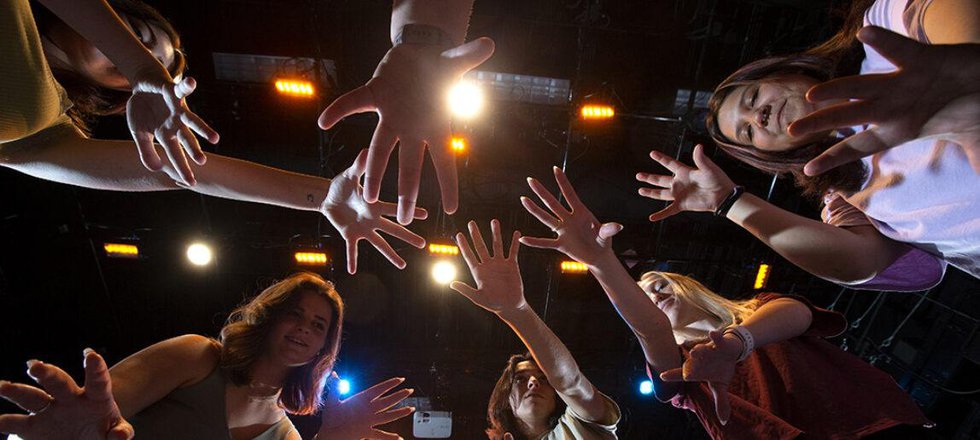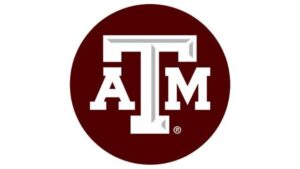The Texas A&M School of Performance, Visualization and Fine Arts will add a Bachelor of Fine Arts degree in Theatre starting in the fall semester. The major was recently approved by the Texas Higher Education Coordinating Board.
Theatre joins the school’s existing majors in Dance Science, Visualization and the recently renamed Performance and Visual Studies.
Rayna Dexter, instructional associate professor and acting program director for Theatre, said the major will prepare students to create and produce theatrical works. This covers three key areas: performance, which includes acting, voice and directing courses; design and production; and arts administration and community engagement.
“The idea is that by taking courses across those areas, students who are interested in one area over the others could use their electives to take additional courses, but everyone has a foundational knowledge in all three areas,” she said.
The major differs from traditional programs with its focus on making new and original works, Dexter said. It doesn’t exclude scripted work and dramatic literature, but encourages students to think differently about building a theatrical performance.
“If you’re going to create a new degree in Texas, it needs to be different from the other degrees available,” she said. “And no one else in the state is doing this. In fact, this is the only program of its kind at a public university in the United States at the undergraduate level.”
Required Major Courses
The major allows for students to start building their skills as soon as they begin, Dexter said.
The first-year courses provide the foundation, including Creating With Care, which covers safety, wellness, well-being and consent-based practices. Dexter hopes it will be a class taken by students across the school’s disciplines.
Students will take introduction courses in acting, stagecraft, theatrical design and dramaturgy. And they will be introduced to devised theatre and its concepts in creating a performance from the ground up. A Devised Theatre minor debuted in fall 2023.
A required course titled Decentering the Text includes script analysis, but then “flipping that tradition on its head,” Dexter said: “What if we’re making performance without a predetermined text script? So, looking at multiple modes of creating in terms of dramatic literary adaptation, or developing your own script.”
Advanced-level required courses include Dramaturgy and Creating Performance, in which students learn about artists who are using devised theatre methods and then try some of those established techniques.
The Devised Theatre Studio course allows students to create their own works for public performance. Those projects could then be selected to be performed in the following year’s theatre season and receive additional faculty, staff and financial support, Dexter said.
Students will choose one course from five Performance Studies Seminar options, which include Historical Performance, Global Performance and Performance Ethnography, along with one Performance History course.
“We have really close ties with Performance Studies, because so many of their classes are really relevant to what theatre-making is,” Dexter said. “We want students to have practical, hands-on experience, but also to have some historical and social context for the kind of work they’ll be making.”
Prescribed Elective Courses
Dexter likens the prescribed elective options as relating to three locations in a theatre: onstage (performance), backstage (design and production) and offstage (arts administration and community engagement).
Onstage: Students will select three courses, with options including Physical Acting; Improvisation and Partnering; Performance in Virtual and Augmented Realities; Sonic Improvisation; and Playwrighting and Concert Choreography.
Backstage: Three courses will be selected, with options including Sonic Design; Stage Makeup; Costume Technology; Stage Management; Creative Costuming; and Art of Light.
Offstage: Two courses will be selected, with options including Archiving and Documenting the Performing and Visual Arts; Creative Movement for Children; Applied Theatre; Theatre Pedagogy; and Wellness and the Performing Artist.
As with all programs in the School of Performance, Visualization and Fine Arts, interdisciplinary work is valued with this new degree. As an example, Dexter noted the way new technology can influence live performances and the live experience.
The variety of the electives will encourage students to explore multiple interests and increase their marketability, she said.
“We know that today’s job market rarely allows a theatre professional to do just one thing all the time,” she said. “You can’t just be an actor anymore — you’re also doing voiceovers. Or you’re doing publicity work or something around the business of theatre. We need to make sure we’re preparing students for the realities of that job market. What it provides our students is a great sense of freedom — that as technology changes, as our society changes, they have the flexibility and transferability to be able to follow those interests.”
Blazing New Trails
Students who earn the Bachelor of Fine Arts degree in Theatre can explore professional paths including creating their own theatre companies, forming theatre-making groups and taking their works to festivals, Dexter said. Other avenues are joining not-for-profit arts groups, educational organizations including museums and living history programs, and immersive arts experiences like Meow Wolf.
Dexter noted that it’s a challenging time for some arts programs around the country, which makes Texas A&M’s expansion through the School of Performance, Visualization and Fine Arts an exciting development.
“And beyond that, we’ve been told to develop something new and unique,” she said. “Most of the faculty who work in theatre have spent their careers working in places where the curriculum was developed in the early 20th century and hasn’t changed much. It’s sometimes a struggle to adapt to the 21st century in the types of shows they’re producing and the skills they’re training their students in.
Courtesy of Texas A&M Today




